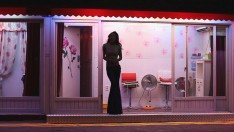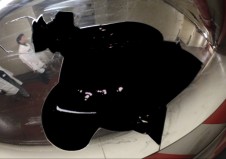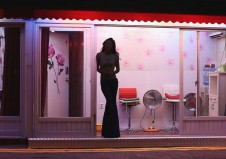What We Imagine in Its Absence / Part 2: Caroline Key

Still from Grace Period, by Caroline Key and Kim KyungMook
In order to know something, must we be able to see it? If not, then how do we come to know what refuses visibility? What is imagined in what we cannot see?
This three-part program series explores these questions by engaging with the works of two artists and filmmakers Vika Kirchenbauer (Berlin) and Caroline Key (Brooklyn, NY). Within their respective practices, these artists meditate on conditions of alterity and constructions of otherness by exploring opacity as a mode of formal, conceptual, and aesthetic address.
Rather than prioritizing notions of transparency and the insistence of visual representation as a central means of capture, Kirchenbauer and Key instead call attention to the gaps, traces, and peripheries of the subjects within their works. Through utilizing forms of experimental non-fiction, essay, translation, and performance, the artists’ works in this series reflect on the conditions of medicalized, institutional, and state violence and its material and affective impacts on subjects marked by racialized, gendered, classed, and sexual difference. They allow us to consider what remains unknowable, invisible, or unremembered within the limitations of the image and its production, and by doing so, reveal what often lies in plain sight -- reorienting us to other registers of perception, speculation, and impossibility.
Programmed by Leeroy K. Y. Kang
PART 2: CAROLINE KEY
This program highlights two works by Brooklyn-based filmmaker and artist, Caroline Key, including the Los Angeles virtual premiere of her new short film KHÔRA, and her experimental documentary feature GRACE PERIOD, co-directed by KyungMook Kim in 2015.
As part of the artist’s ongoing interest in examining conditions and formations of alterity, these works are brought together in their various political and aesthetic expressions of refusal through a range of cinematic practices, including documentary non-fiction, experimental video, animation, and digital graphics. Within this space of refusal, issues of body sovereignty, gendered and sexualized labor, and economic precarity are brought to the fore as the artist negotiates what is both revealed and withheld within the frame. These themes and visual considerations work to ultimately deny the recorded image as an irrefutable source of evidence in maintaining institutional and state-sanctioned order and control. Rather than fully exposing or revealing her subjects, Key instead withholds, suspends, or obscures their images, often rendering them opaque as a means for us to imagine what is implicated in their visual absence.
In KHÔRA (2019), the artist utilizes “medical waste” footage from her experiences working as a hospital OBGYN surgical videographer to investigate the relationship between visibility, medical knowledge, and the production of an image economy that renders the intimate body as a knowable and circulated commodity. While details of the body undergoing surgical operation are blacked out through digital manipulation, the hard contours of the robotic, surgical tools remain within distorted view, exposing medicine’s technological intervention upon it. Combining these images along with lush and fleshy original 3D medical animation, obscured views of hospital corridors, and imagery alluding to Dr. Marion Sims and gynecology's problematic origins, Key presents a complex filmic inquiry into the knowability of the body within the medical gaze.
The artist’s considerations of visibility and opacity are further embodied in her earlier feature film GRACE PERIOD (2015). This experimental documentary depicts a group of sex workers in the Yeongdeungpo district in Seoul and their collective resistance to the accumulating effects of government crackdowns on their work and space as a result of South Korea’s Anti-Sex Trade Law. Drawing us away from the humanitarian impulses of traditional documentary filmmaking, the film utilizes various visual techniques and approaches to temporality that portray the women’s spaces of political protest and intimate sites of work with careful consideration. Throughout the film, the figures of the women are digitally rendered as flickering silhouettes while they are at work as an effort to maintain their physical presence, while honoring their anonymity. This obstruction of their image not only functions to protect their anonymity, but also serves to refuse the notion that one’s identity can be captured and held by an image. Instead, we are drawn to consider the conditions of violence and precarity that mark these women’s lives through the forces that always remain within and beyond the frame.
TRT: 69 mins
Other programs in the series:
PART 1: Vika Kirchenbauer (May 13 - 16)
PART 3: Conversation with Vika Kirchenbauer and Caroline Key, moderated by series programmer Leeroy K. Y. Kang (May 27)
Caroline Key is a filmmaker and video installation artist currently based in Brooklyn, NY. Employing a range of cinematic practices- 16mm film, alchemical film processing, documentary, animation, and digital manipulation- her films and videos investigate the construction and negotiation of identities rooted in conditions of alterity. Her works have shown internationally in festivals and galleries, including the Arsenal Cinema in Berlin, the Smithsonian Hirshhorn Museum, the Seoul Independent Film Festival, the Margaret Mead Film & Video Festival, the Chicago Underground Film Festival, and the Images Festival in Toronto. Caroline has received awards from the Foundation for Contemporary Arts, the Jerome Foundation, the Sarah Jacobsen Film Grant, and the NYSCA/ARTS Council of the Southern Finger Lakes. She received her MFA in Film/Video from the California Institute of the Arts, her BFA from the School of the Art Institute of Chicago, and was a participant in the Whitney Independent Study Program. Caroline teaches filmmaking at Rutgers University.

KHÔRA
KHÔRA
Caroline Key, 2019, 7 mins
*Los Angeles Virtual Premiere

GRACE PERIOD
GRACE PERIOD
Caroline Key and Kim KyungMook, 2015, 62 mins.
*Los Angeles virtual premiere
